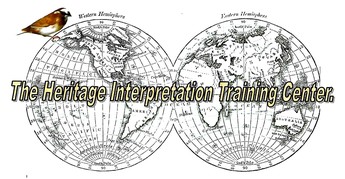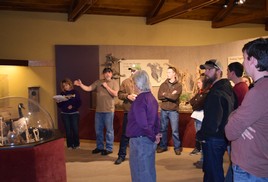John Veverka & Associates
Main menu:
- Home Page
- Our Range of Services
- Interpretive Coaching
- Interpretive Planning
- Interpretive Plan Outline
- Interpretive Training
- John Veverka Resume
- NEW Advanced Interp. Text Book
- InterpNEWS
- Library
- JVA NEWS, Courses and Updates
- Certificates
- Planning/Design of Interpretive Panels
- Interpretive Writing
- Interpretive Writing Course
- Interpretive Trails Course
- Interpretive Panels Course
- Introduction to Heritage Interpretation Course
- Interpretive Planning & Design of Marketing Brochures Course
- Training for Interp. Trainers
- Interpretive Exhibits Course
- Interpretive Master Planning Course
- Interpretive Planning for Scenic Byways.
- Critiquing and Coaching Interpretive Staff
- Advanced Interpretive Planning
- Interpretive Training Center Course Catalogue
- Interp. for International Visitors course.
- Interpretive Exhibits Evaluation
- Interp. Center Feasibility Analysis Course.
- Interp. for Commercial Tour Providers
- Interpretive Researchers Guide for Visitor Studies
- Interp. Planning for Historic Homes
- Heritage Interpretation Training Center
- Interpretive Planning for Botanical Gardens
- An introduction to planning and presenting live interpretive programs and tours for Museum/Heritage Site Docents and Volunteers.
- Developing Marketing Plans for Heritage & Tourism Sites and Attractions
- Interpretation Book Store
- Heritage Interpretation Resource Center
- Interpretive Planning for Historic Farms
- Developing Successful Partnerships
- Developing Interpretive Outreach Programs
- Community Interpretation Planning
- Interpreting Gravestones and Historic Cemeteries
- Using Interpretation to Accomplish Management Objectives.
- An Interpreters Guide for Survival Economics.
- Innovative Strategies for Interpretive Media and Services Planning.
- A Curators Guide for Developing Gallery Tours.
- Advanced Interpretive Writing - Technical Publications
- Advanced Interpretive Services for Managers, Supervisors, Team Leaders and Sr. Staff.
- Advanced Interpretation for Chiefs of Interp. - Interpretive Managers - Regional Interp. Specialists
- Interpreting Critical Issues.
- Developing Commercial Interpretation for Resorts, Cruise Ships, Campgrounds and Tourism Attractions.
- Planning and developing a new commercial tour guiding business.
- Interpretive Evaluation, Visitor Studies and Site Assessment Center
- The Center for Interpretive Planning Advancement & Excellence.
- Developing Requests for Proposals (RFPs)
- Planning and Facilitating Focus Workshops
- Planning for Interpretive Experiences
- 40 Years a Heritage Interpreter
- Interpretive Techniques - The Rest of the Story Course
- Certified Professional Interpretive Planner Certificate
- Certified Professional Interpretive Program
- Certified Professional Interpretive Writer certificate program.
- Visitor motives for attending interpretive programs.
- Exhibit Rehab Course
- Developing Training Workbooks & Manuals
- Planning for Railroad Museums and Sites.
- Climate Change Interpretation Course.
- When there's nothing left but the story - interp. storytelling.
- Interpreting Legends Myths and Fables
- InterpSHARE - Seminars 2022
- Interpreting Invasive Species
- Interpretiing Edible Insects
- Interpretaive Planning for Climate Change
- HITC Climate Crisis Resource Center
- PUP Members Only
- Starting a new Interp Consulting Business
- Panels 4 Week Course
- Interpretive Writing - 4 Week Course
- Marketing - 4 Week Course
- Intro to Interpretation - 4 Week Course
- Interp Climate Change - 4 Week Course
- Exhibit Rehab 4-Week Course
- Level 1
- Johns Interpreters Blog
- John Interpreters Blog 2
A Curators Guide for Developing Gallery Tours.
Heritage Interpretation Training Center
A Curators guide for helping their docents/volunteers create truly interpretive gallery
tours for Art and Traditional Museums.
Techniques for revealing the hidden stories and meanings in art and
artifacts for presenting dynamic and inspirational interpretive
tour experiences for your visitors.

12 Units, 2 CEU Credits
Course Tuition: $200.00
While gallery tours by docents/volunteers are a staple at art museums and traditional museums as well, most education curators would like the tour to be more than a "Wikipedia" tours of "just the facts". Interpretive tours are focused on a theme and revealing a story to the visitors - with objectives (outcomes) they want the tour to actually accomplish. This training course will help curators help prepare their docents for tours that:
1. Have an interpretive theme.
2. Have accomplishable objectives.
3. Has about 7 tour stops, each of which illustrate the main interpretive theme.
4. Use interpretive communications structure for each stop (provoke, relate and reveal).
5. Use the techniques of tangibles and intangibles in their presentation.
6. Encourage the use of multiple senses to relate to visitors.
7. Have a provocative introduction and then ending conclusion summary for the tour.
8. Have as much "inspiration" as "information".
9. Leave the visitors asking for more (when's your next tour?).
About the Instructor: Prof. John Veverka

- B.S and M.S in Heritage Interpretation - The Ohio State University
- Ph.D. program in Interpretation at Michigan State University.
- Adjunct Professor Heritage Interpretation (summer heritage tourism institutes) North Carolina State University,
- New York State University. Adjunct Professor, Heritage Tourism Institute.
- NAI Certified Interpretive Planner and Trainer
- NAI Fellow
- Certified Professional Heritage Interpreter (Canada).
- Author of several interpretive planning/training college text books.
- Publisher of InterpNEWS - the International Heritage Interpretation e-Magazine.
- 40 years of interpretive planning, training and writing experience.
- Sr. Instructor, Kansas State University - Global Campus.
First, visit with me here on YouTube: https://www.youtube.com/watch?v=f38Y7mqILYw
How does e-LIVE work? Our e-LIVE courses are limited to 10 participants at one time, to allow for maximum interaction with the course instructor. Once one participant completes the course another participant can be added.
- You'll be given course content to read and interact with for each unit.
- JVA will provide you with reading assignments, text book and reference articles as part of the course, that you keep for your library.
- You'll be given a assignment for each unit which you'll send to John for review, comments and coaching if desired. You'll be able to talk with John about each assignment via SKYPE, or by e-mail or phone. Thus the e-LIVE opportunity. John will be your instructor and coach who you can talk with at any time about your assignments. Remember that John is in Michigan (Eastern Time Zone), so it's best to e-mail John to set up a time to chat.
- When you've completed each course unit you'll be sent the next unit for the course. Again, you'll be given assignments for that unit to submit to John for review, comments and coaching or discussion is needed.
- When you've completed the eleven units you'll be awarded a Certificate of Completion and 2 CEU (Continuing Education Unit) credits.
Additionally, you can work on assignment for actual docent training projects you may be working on - museum gallery tours, marketing materials or other interpretive tour development projects. That is the benefit of e-LIVE - we are flexible in designing the course to meet your real-world needs.
The estimated completion time of the course is about 20 hours - and you can work at your own pace.
What are the Units?
Unit One - What makes the interpretive gallery tour "interpretive" vs. just informational?
Unit Two - Overview of interpretive communication principles, active language, and using tangibles and intangibles in interpretive presentations.
Unit Three - Understanding your tour group - who are they, what are their interests, how to read your audience to make quick interpretive adjustments in your presentation language, examples and engagement techniques.
Unit Four - what topic do you want the tour to reflect - what is the overall museum mission and main museum interpretive theme you will need to include in your introduction.
Unit Five- Developing your interpretive theme and learning, emotional and behavioral objectives for the tour.
Unit Six -Analysis of the best exhibits to have as tour stops, and the best tour route to use to illustrate your tours interpretive theme. Where will your tour stops be?
Unit Seven- Your tour logistics plan. Tour dates and times, where will the tour begin (where to meet the tour leader) - visitor numbers for the tour - planning stops where everyone can see what is being interpreted or share tour interpretive experiences, tour length, tour rules, etc.
Unit Eight- Planning your tour using a Interpretive Tour Planning Form to record your tour theme, objectives, tour stops and any teaching aides you will need and summary of tour logistics.
Unit Nine - developing your tour introduction - introducing your theme, tour logistics, etc. to your tour group - provoke, relate and reveal.
Unit Ten - planning for your thematic transitions from one tour stop to another (end stop # one with a "provoke" to get them ready for the interpretation for at stop #2).
Unit Eleven - Developing your tour summary - (Tell them what you told them .... repeat your theme in the summary i.e. " I have shown you 7 examples of just how.....".
Unit Twelve - evaluation - how did you do?
Course Costs and Registration.
The cost for the 20 hours training with live interaction with the instructor is $200.00 USD.
You can pay via credit card or Pay Pal. You can also pay by check or purchase order to bill your agency.
Here is how to register for the course:
1. Contact John Veverka by e-mail to see if there are current openings in the course (limited to 10 participants at one time). Contact John at: jvainterp@aol.com.
2. Once you receive your registration form, you can pay the course tuition. You can pay by credit card or paypal here at the web site (below). If paying my check, you can mail your payment to John Veverka at the address below.
3. Once all this business bit is completed, John will send you Unit One and all related course materials and an e-copy of his text book "Interpretive Master Planning". He will also be happy to chat with you as well to make introductions and get you going.
In you have any questions at all, please feel free to ask.
For payments by check or money order (in USD), mail to:
John Veverka & Associates
5010 Delray Drive
Lansing, MI 4810 USA
For Payment by credit card or paypal use the "pay now" button below.